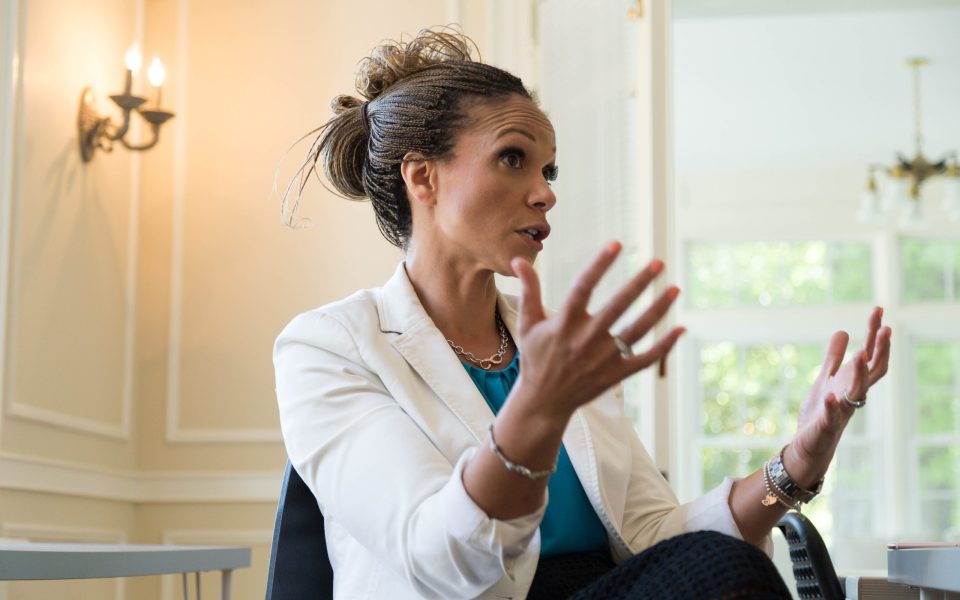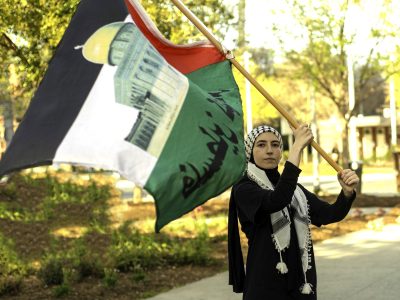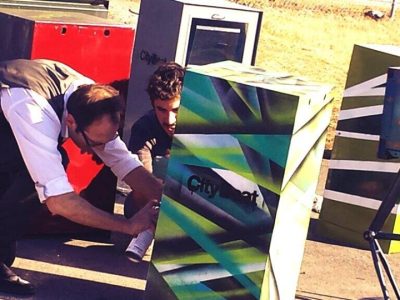photos by Ann Thuy Nguyen
Melissa Harris-Perry’s résumé and endorsements amount to a staggering list. Ta-Nehisi Coates called her “America’s foremost public intellectual” back when she hosted the “Melissa Harris-Perry” show on MSNBC. Since obtaining a PhD from Duke, she’s been on the faculty at the University of Chicago, Princeton and Tulane University. Harris-Perry is the editor-at-large at elle.com, she spoke at the Women’s March in Washington, DC and she’s interviewed Barack Obama, among countless other significant figures.
But when Melissa Harris-Perry returned to Wake Forest University — where she is now the Maya Angelou Presidential Chair, the director of the Pro Humanitate Institute, founding director of the Anna Julia Cooper Center and more — she felt nervous just like she did as an undergrad student here two decades earlier.
“Benson, our student center, was built while I was here as an undergraduate,” Harris-Perry said, sitting in a meeting room of the Anna Julia Cooper Center on campus recently. “I was standing in Benson, getting my lunch, I don’t know, my first or second week back? And I just absolutely felt 18.”
When she turned and saw Randolph Childress — a former NBA player and Wake’s assistant basketball coach whose time as a Wake Forest student overlapped with her own — Harris-Perry freaked out.
Retelling the story, she jumped a little in her seat and shrieked. Laughing and saying that she “had more than a little crush” on Childress as a student, she said: “I didn’t actually scream, but that was the feeling I had inside me, like, Ahh! I could no more speak to Randolph Childress [then] than I could in [the 1990s].”
They’re both married now, and Harris-Perry has two kids, including a high schooler, but the experience of being back at Wake Forest University coupled with running into Childress — who played alongside Wake’s Tim Duncan and battled UNC’s Jerry Stackhouse and Rasheed Wallace before going pro — transported her in time.
“That kind of wrinkle in time, that kind of folding in, is both really wonderful and really difficult to manage because Wake is the sort of place where nothing changes but everything is different,” Harris-Perry explained. “There’s so many things that are just as they were.”
She learned from her father — a retired college professor — that at some point in everyone’s teaching career they need to move from the “hip, young professor” to the “distinguished, older professor” they are at retirement. At some point, professors need to make the transition, Harris-Perry recounted, adding that “you don’t want to do it too soon because you know it seems like you’re putting on airs, but the really tragic thing is to do it too late and thinking you’re still the hip, young professor when you’re really not.”
When she returned to Wake Forest as a professor a couple years ago, Harris-Perry still thought of herself as the hip, young version. Nothing will make you feel like you’re 20 like being back on your undergrad campus, she said, but standing in front of a class and realizing that her students were born around the time she graduated drove home the fact that the professional transition that her father spoke of was looming.
Harris-Perry still doesn’t consider herself the “old, distinguished professor” either. Her students call her “MHP” or “Prof MHP,” and despite her widespread acclaim, she doesn’t think twice about pausing an interview to welcome and help a stranger who walks into the Anna Julia Cooper Center on Reynolda Road.

Despite leaving MSNBC — a much longer story that’s been covered by the likes of the Washington Post and others — Harris-Perry still travels constantly. Gone are the predictable weekend trips up to New York for a big paycheck. In their place are regular trips for public lectures as a way to make up for some of the lost income.
But Harris-Perry relishes her time at home in Winston-Salem, and not just because her family — including her husband and Winston-Salem Urban League CEO James Perry, her mother, daughters and sister — lives here. She loves something that Winston-Salem affords her that other cities haven’t: land.
Her family lives on about two acres in the Washington Park neighborhood in southern Winston-Salem, and as soon as the weather allows each year — which Harris-Perry said means February — she’ll be outside digging in the dirt.
“I garden like a crazy person,” Harris-Perry said. “There’s a bit of a joke among my staff and family that I move every single rock in my yard to a different location each spring because it just should be moved, not even because it has to be. I like change.”
Last year she built a patio. At the beginning of the summer, she said she intended to move the whole thing this season, adding that she’s a regular fixture out in the yard with her wheelbarrow.
“No one talks to me while I’m out there,” she said, adding that it’s a nice reprieve. But that’s not the only reason she gardens.
“I was brought up Unitarian Universalist,” Harris-Perry said, “… and kind of our whole faith claim is rooted in nature.”
The resurrection of perennials is like how Unitarians know God is real, she said, adding: “There’s a great deal of faith associated with gardening.”
“You don’t want to get me started on this, because the lessons of the garden, when you have to really prune back things that are dead to get to the things that are good, the faith that’s related to something looking like there’s really nothing in the ground but really there is, being willing to tend a garden, or literally put s*** in a pile for a year and then have it turn into compost,” she continued. “You know, there’s all kinds of lessons from a garden for me that are real, and just sort of operate at a philosophical level that I appreciate, and that I just enjoy out there.”
 Harris-Perry has several chickens at home, including one named Harriet that’s known to escape.
” data-medium-file=”https://i1.wp.com/triad-city-beat.com/wp-content/uploads/2017/08/Melissa-Harris-Perry-chicken.png?fit=300%2C283&ssl=1″ data-large-file=”https://i1.wp.com/triad-city-beat.com/wp-content/uploads/2017/08/Melissa-Harris-Perry-chicken.png?fit=696%2C657&ssl=1″ data-recalc-dims=”1″>
Harris-Perry has several chickens at home, including one named Harriet that’s known to escape.
” data-medium-file=”https://i1.wp.com/triad-city-beat.com/wp-content/uploads/2017/08/Melissa-Harris-Perry-chicken.png?fit=300%2C283&ssl=1″ data-large-file=”https://i1.wp.com/triad-city-beat.com/wp-content/uploads/2017/08/Melissa-Harris-Perry-chicken.png?fit=696%2C657&ssl=1″ data-recalc-dims=”1″>
©
Harris-Perry constructed a koi pond over spring break last year. She grows flowers including roses, sunflowers and azaleas as well as an abundance of food including tomatoes, eggplants, beans, potatoes, corn, yellow squash, zucchini, Brussels sprouts, cantaloupe, strawberries and watermelon. She had kale, lettuce, spinach and collards recently too until her chickens — yes, she keeps chickens, too — tore everything but the kale to shreds.
Looking out over the yard recently, while kids played on a swing set and in the small pond and while family grilled and socialized nearby, Harris-Perry felt satisfied.
“This is what I’m going for,” she said. “In my twenties, I would’ve been like, Oh my god, get me out of here. But I’m in my forties now.”
Winston-Salem isn’t perfect, of course. But she said the only day of the week she wishes she lived in Washington, DC or New York is Sunday.
“I know the churches that I’d go to in those two cities,” she said, adding that she and her Catholic husband have struggled to find a church home locally that is progressive like the Unitarians but more racially diverse than the congregations they’ve tried.
As school starts again for the fall, Harris-Perry marks the beginning of her fourth academic year at Wake Forest. No doubt she isn’t as nervous as she was those first weeks in 2014. She’s settled into her role now and has no intention of leaving Wake in Winston-Salem, save for those frequent trips.
But whether she’s in the classroom, on the road with students (taking them around the country for Wake the Vote political education lessons or bringing them to New York as part of a journalism mentorship program), or in her garden, Harris-Perry will be getting her hands dirty, reveling in the opportunity to be digging in the weeds.
Join the First Amendment Society, a membership that goes directly to funding TCB‘s newsroom.
We believe that reporting can save the world.
The TCB First Amendment Society recognizes the vital role of a free, unfettered press with a bundling of local experiences designed to build community, and unique engagements with our newsroom that will help you understand, and shape, local journalism’s critical role in uplifting the people in our cities.
All revenue goes directly into the newsroom as reporters’ salaries and freelance commissions.





Leave a Reply